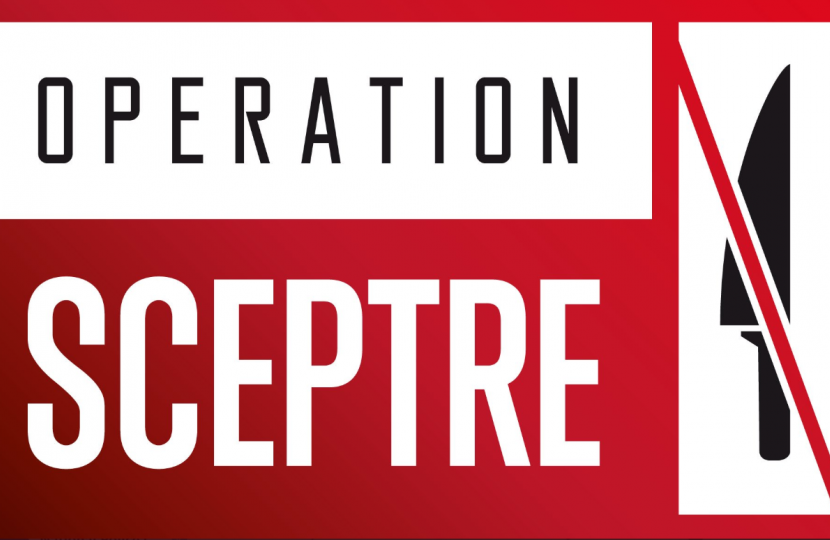
As part of the Op Sceptre Knife Crime Campaign, South Swindon MP Sir Robert Buckland is asking parents, guardians, and those who care for young people here in South Swindon, to talk to them openly about the dangers of carrying a knife, as well as the life-changing consequences that come from carrying a knife, as you can play a vital role in preventing them from becoming involved with knife crime.
Operation Sceptre is an opportunity to highlight the vital work that police carry out on a daily basis.
As part of the two-week campaign police will coordinate activity which targets knife crime from the root cause right through to enforcement.
Police here in Swindon and beyond will engage with local communities, work with young people to dispel myths around knives, and carry out test purchases with retailers.
Op Sceptre also includes a knife surrender campaign to encourage the public, particularly young people here in Swindon, to hand in any knives and bladed weapons they have in surrender bins in Swindon, without fear of repercussion.
Sir Robert Buckland said:
“In my work as a barrister, before I became an MP, I dealt with lots of cases involving knives and young people and witnessed first-hand the devastating effects that knife crime can have on a community.
“As a barrister, when questioning young people about their reason for carrying a knife, I was told over and over again that they were doing it for their own protection. The sad truth is that many of the knives carried by young people have then been used against them when a fight or another disturbance has occurred.
“In both my role as Solicitor General and as Justice Secretary, I worked hard to tackle the issue of violent crime, introducing justice reforms to ensure that serious and violent offenders spend longer in custody, as well as introducing new measures aimed at tackling the underlying causes of criminal behaviour and improving rehabilitation.
“By talking openly to young people about the dangers of carrying a knife, you can play a vital role in preventing them from becoming involved with knife crime.
“I hope that the following simple advice will help you to have a conversation with a young person you care for.”
- Firstly, establish the most appropriate time and setting to have an open conversation about knife crime; it should be somewhere that you both feel comfortable.
- Be aware that a young person may be reluctant to talk to you about knife crime, so reassure them that they can be honest with you, as well as letting them know that you will listen to what they have to say and support them without judgement.
- Encourage them to share their fears and worries. We know that fear and a feeling of vulnerability is often the reason behind people carrying knives. Many young people do so because they are afraid for their own safety, and they believe a knife will protect them. So, it's important that they realise, that their chances of becoming a victim of knife crime increases just by carrying one.
- Sharing your own fears can also help, as this can help them open up.
- Highlight that the vast majority of young people don’t carry a knife as they do not give you protection, and it's not acceptable.
- Let them know that they do have a choice when it comes to carrying a knife, even though it may seem to them like they don’t.
- Encourage them to consider who they’d be affecting if they get involved in knife crime and what consequences can come from it, such as being expelled from school, being sent to prison, or even worse, someone tragically losing their life. Also reiterate to walk away from a dangerous situation.
- It's important that we ask young people to look out for their friends; it's not right to stand by and do nothing if they know a friend is carrying a knife or weapon. We advise they tell a trusted adult, such as a parent, family member, or teacher. If they are worried that someone will find out, you can report their concerns anonymously through CrimeStoppers on 0800 555 111.
- During a conversation about knife crime with your child, you may hear some upsetting and concerning things about what they, and even their friends may be involved in, but try not to get upset or overreact as you don't have to deal with this on your own – help is available via CrimeStoppers or the Fearless campaign website: https://www.fearless.org/en/give-info.
For further information on the location of surrender bins, as well as information you can use to talk to young people about the dangers of carrying a knife, please visit https://www.wiltshire.police.uk/police-forces/wiltshire-police/areas/campaigns/campaigns/op-sceptre/op-sceptre/
If you have concerns about someone you know or care about who is carrying or hiding a knife, or if you are aware that knives are being concealed in your community, call the Police on 101. Always dial 999 in an emergency.




